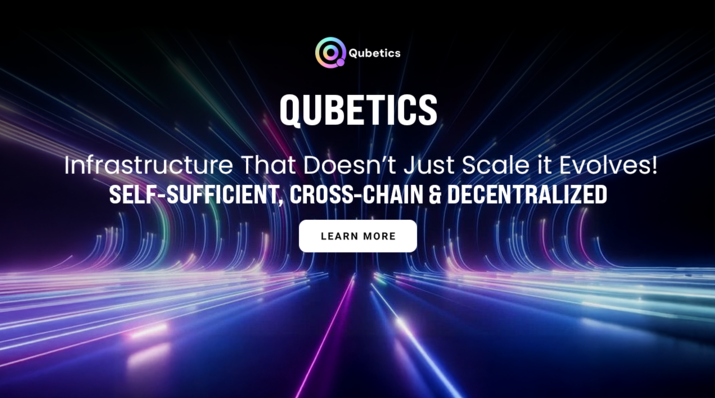How do you spot a breakout project in a market that’s bouncing between fear and cautious optimism? When legacy giants like BNB battle regulatory headwinds and privacy stalwarts like Monero fend off renewed surveillance chatter, the answer might lie in a quieter, faster-moving project solving real-world problems right now.
BNB is treading water after months of legal uncertainty, while Monero continues to draw both praise and heat for its strict privacy-first design. Both have their place—but neither is breaking new ground. Meanwhile, Qubetics ($TICS) is gaining serious attention with its cross-chain interoperability model, a presale that’s climbing stage-by-stage, and a roadmap that feels refreshingly execution-focused. It’s becoming clear that this under-the-radar Web3 play is one of the best cryptos to join this month.
Qubetics Bridges the Blockchain Divide With Real-World Interoperability
Cross-chain chaos has long been the Achilles’ heel of crypto adoption. Most platforms live in silos—Ethereum doesn’t talk to Solana, Cosmos doesn’t connect easily to Avalanche, and centralized bridges have proven to be massive vulnerabilities. This is where Qubetics steps in—not just as another blockchain, but as the first Web3 aggregator built specifically to unify fragmented ecosystems.
At its core, Qubetics offers an interoperability layer that lets users, developers, and even entire enterprises move assets, data, and applications across blockchains—seamlessly and securely. Imagine a decentralized app that pulls liquidity from Binance Smart Chain while settling final transactions on Ethereum, all without manual swaps or risky wrapping. That’s what Qubetics is enabling.
For everyday users, it means no more jumping through hoops or getting burned on gas fees just to shift between platforms. For a growing e-commerce startup? Qubetics allows backend logic to tap into real-time chain data across protocols—Ethereum for smart contracts, Polygon for speed, and Cosmos for scalability—all integrated. For institutions aiming to launch tokenized real estate or digital IDs across regions with differing blockchain regulations, this is gold.
By acting as the connective tissue of the decentralized internet, Qubetics isn’t just another project. It’s building the roads, rails, and traffic signals for the multichain future. That alone places it high among the best cryptos to join this month.
Qubetics Presale ROI: Why Early Entry Could Deliver One of the Best Cryptos to Join This Month
Now for what’s really turning heads: the Qubetics presale is in Stage 35, with a current token price of $0.2785—but here’s the kicker. Every stage only lasts 7 days, and each new stage bumps the price by 10%. That’s not marketing hype—it’s built into the protocol, and so far it’s driving serious momentum.
Over $17.3 million has already been raised, and 513 million $TICS tokens have been sold to more than 26,900 token holders. It’s clear that early adopters see what’s coming, especially with the mainnet launch set for Q2 2025.
For anyone eyeing long-term plays, the math here is hard to ignore. At today’s price, if $TICS hits $1 post-presale, the ROI sits at 258.95%. A $5 post-launch price? That’s a wild 1,694.74% ROI. Should $TICS climb to $10, that initial position delivers 3,489.47%. And at $15, the potential return explodes to 5,284.21%.
To put that into perspective: a $100 entry now could grow into $1,694.74 at $5 per token—or $5,284.21 at $15. That’s why many are calling the Qubetics presale the best crypto pre sale on the market right now. It’s not just about charts and buzz. It’s about a presale that behaves like clockwork, tied to real utility, with a community growing as fast as its valuation.
BNB Pushes for Stability But Can’t Shake Off the Legal Fog
BNB, the native token of Binance, has always walked a tightrope between explosive growth and regulatory firestorms. In 2024, it weathered a serious blow when Binance CEO Changpeng Zhao stepped down and regulatory agencies around the world clamped down on centralized exchanges. Fast forward to now, and BNB seems to have regained its footing—but uncertainty still lingers.
The token has stabilized above the $580 level, driven by rising utility within the Binance ecosystem. From staking and lending to DeFi integrations and cross-chain capabilities, BNB remains a workhorse. But its fate is tied tightly to Binance’s ability to navigate a landscape filled with compliance flags and global oversight.
Recent news around Binance’s European restructuring and efforts to decentralize core services might help clear the fog, but BNB doesn’t move freely. Every update comes with caveats, and its growth potential feels increasingly limited by external forces. While it’s not exiting the stage anytime soon, BNB lacks the underdog agility and future-facing appeal that projects like Qubetics are bringing to the table.
Monero’s Mission for Privacy Continues—But the Pressure Is Mounting
Monero (XMR) has long been the poster child for privacy coins—shielded addresses, ring signatures, and fully confidential transactions. That’s made it beloved by privacy advocates and deeply misunderstood by regulators. In fact, some jurisdictions have begun delisting Monero altogether, citing compliance risks tied to AML and KYC enforcement.
Despite this, Monero’s network remains resilient. Transactions are steadily rising, and its tech stack continues to evolve. The upcoming implementation of Haveno DEX and additional privacy layers offer compelling upgrades. But Monero operates in an increasingly hostile environment.
Even as a decentralized project, Monero can’t dodge the reality that financial regulators are gunning for privacy tokens. Exchanges dropping support and governments scrutinizing on-chain privacy may slow down Monero’s reach. While it still holds value as a privacy solution, its upside feels constrained unless the wider market trends swing radically in favor of anonymous finance.
Qubetics, by contrast, takes a different route. It enables cross-chain privacy and utility without triggering the same level of institutional red flags, largely because it’s focused on business-friendly interoperability—not anonymous transfers.
Qubetics, BNB, or Monero—Which Deserves the Spotlight This Month?
Zoom out, and the landscape is clear. BNB is fighting to maintain its dominance under a microscope. Monero’s tech is strong, but the walls are closing in. Qubetics, meanwhile, is rolling out new functionality weekly, locking in momentum with a transparent presale model, and targeting real pain points in today’s multichain chaos.
That’s why, among all the movement in crypto right now, Qubetics is earning its place as one of the best cryptos to join this month. It’s offering a clear roadmap, real-world use, a growing community, and a presale that’s rising like clockwork. For early adopters looking to ride value, not vibes, this one’s shaping up as the dark horse worth watching.
For those scouting the best crypto presale with serious growth prospects and institutional appeal, Qubetics might just be the one the others don’t see coming—until it’s too late.
For More Information:
Qubetics: https://qubetics.com
Presale: https://buy.qubetics.com/
Telegram: https://t.me/qubetics
Twitter: https://x.com/qubetics
FAQs
What makes Qubetics one of the best cryptos to join this month?
Qubetics solves cross-chain fragmentation through real interoperability and offers a fast-moving, well-structured presale with strong projected returns.
How much has Qubetics raised in its presale?
Qubetics has raised over $17.3 million with 513 million $TICS tokens sold and more than 26,900 participants.
Is Monero still safe to buy despite privacy crackdowns?
Monero offers strong privacy but faces increasing regulatory pushback, making access and listing a growing concern.
Disclaimer: Any information written in this press release does not constitute investment advice. Optimisus does not, and will not endorse any information about any company or individual on this page. Readers are encouraged to do their own research and base any actions on their own findings, not on any content written in this press release. Optimisus is and will not be responsible for any damage or loss caused directly or indirectly by the use of any content, product, or service mentioned in this press release.



